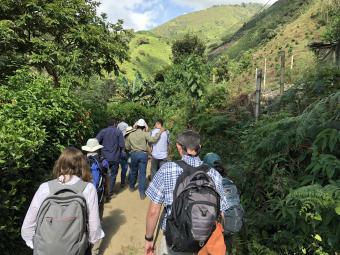Humanitarian Engineering program gets NSF grant to support low-income graduate students
Award will support up to 43 graduate students over six years in the Humanitarian Engineering and Science graduate program

The Humanitarian Engineering (HE) program at Colorado School of Mines has been awarded a $1.46 million National Science Foundation grant to support the retention and graduation of high-achieving students with demonstrated financial need.
The award will support 43 graduate students over six years pursuing graduate degrees in Humanitarian Engineering and Science, with specialties in environmental engineering, geophysics, geological engineering and other tracks to be added in the future. Eligible students will receive a $10,000 scholarship their first and second years in the program, as well as opportunities to participate in mentorship and professional development activities.
"This is a huge win for the Humanitarian Engineering and Science graduate program,” said Kevin Moore, executive director of Humanitarian Engineering at Mines. “In only its second year, it is a small but growing program. Having this support effectively jumpstarts our program by giving us the means to attract even more students.”
Specifically, students enrolled in the project will have opportunities to participate in mentorship and professional development activities that connect their STEM learning with their “funds of knowledge,” or the skills and knowledge they develop through their daily work and family lives. These funds of knowledge are highly relevant to science and engineering, said Jessica Smith, director of the Humanitarian Engineering and Science graduate program, but they are infrequently recognized as knowledge in formal classroom settings. This grant will change that by training HES faculty to integrate the funds of knowledge approach into their teaching.
Smith and Juan Lucena, who directs the undergraduate HE program, are nationally recognized for their research on the funds of knowledge of low income and first generation engineering students. Along with Dina Verdín, on faculty at Arizona State University, they recently completed another NSF grant that developed and deployed a national survey that mapped the “funds of knowledge” of undergraduate engineering students across the United States and investigated how they correlate with markers of academic success. This grant will allow for similar investigations at the graduate level.
“Our Humanitarian Engineering and Science students are poised to tackle key problems that impact under-served communities, such as air and groundwater pollution, food insecurity, geohazards and access to clean water and affordable energy,” Smith said. “We are thrilled to be able to support more low-income students to do this crucial work.”
Added Moore: “As an engineering educator who has focused much of my career on design education, I learned from experience that many times our students who came from different walks of life were able to bring a lot of knowledge to the table that some of our students with more opportunity didn’t have. This new NSF award will allow us to enrich the Humanitarian Engineering degree experience for all students in the program as a result of the knowledge base of the scholarship recipients.”




